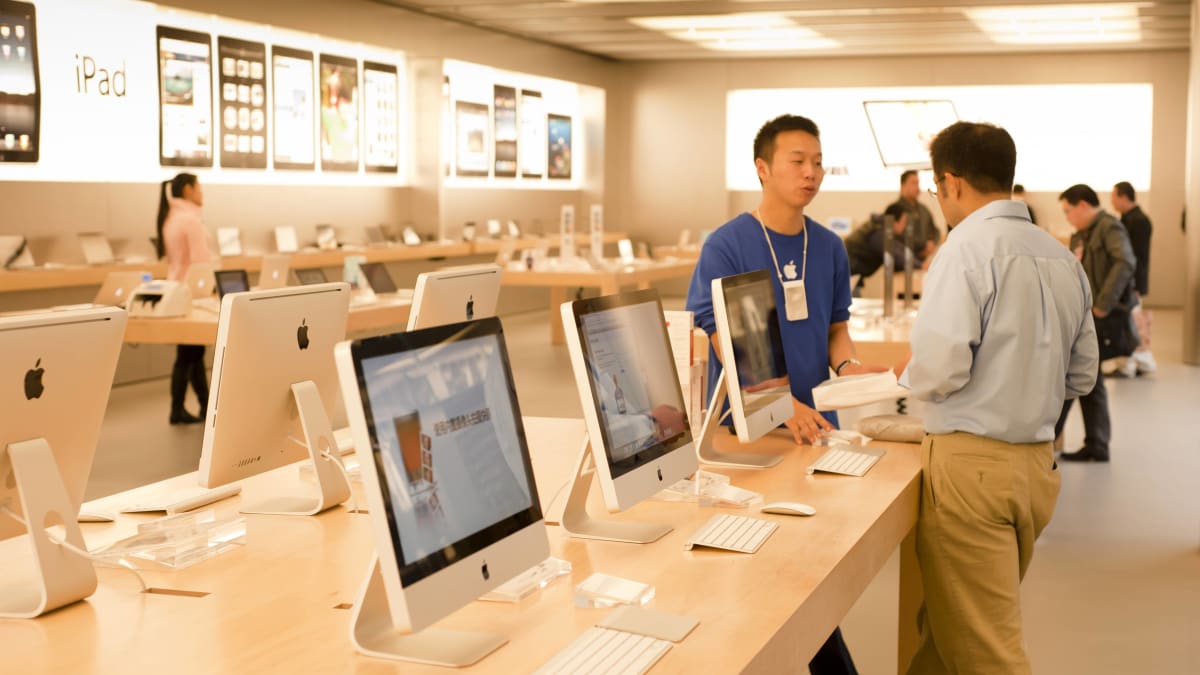
Look out below!
Computer sales tumbled in the first quarter of 2023 with Apple (AAPL) leading the pack, according a recent report from International Data Corporation.
The computer giant saw quarterly sales plummet a jaw-dropping 40.5% to 4.1 million units from the year-ago period. Dell (DELL) posted a 31% slide, while both ASUS and Lenovo (LNVGF) sank 30% and HP (HPQ) was off nearly 20%.
DON'T MISS: March Inflation Slows to 5%, Core Ticks Up; Fed Rate Challenge Intensifies
Overall, global shipments fell 29% from a year go to 56.9 million, according to preliminary results from IDC's Worldwide Quarterly Personal Computing Device Tracker.
So, what's going on here?
IDC sees weak demand, excess inventory, and a worsening macroeconomic climate as all contributing factors to the drop in PC shipments.
High Inventory to Persist
Preliminary results also represented a coda to the era of COVID-driven demand and at least a temporary return to pre-COVID patterns, IDC said.
Shipment volume in the first quarter of this year was lower than the 59.2 million units shipped in the first quarter of 2019 and the 60.6 million units in the same period in 2018
"Even with heavy discounting, channels and PC makers can expect elevated inventory to persist into the middle of the year and potentially into the third quarter," Jitesh Ubrani, research manager for IDC's Mobility and Consumer Device Trackers, said in a statement.
The pause in growth and demand is also giving the supply chain some room to make changes as many factories begin to explore production options outside China.
In February, Apple reported weaker-than-expected first quarter earnings, as well as its first annual revenue decline in four years, as the tech giant suffered from supply chain snarls in China.
Mac sales fell 29% from last year to $7.74 billion, Apple said, although iPad sales were up by 30% to $9.4 billion.
Several big tech companies are reportedly looking to shift their supply chains away from China amid rising tensions with the U.S.
Shipments Could Pick Up by Year End
The Creating Helpful Incentives to Produce Semiconductors and Science Act of 2022 (CHIPS Act), was signed into law last year and is designed to boost US competitiveness, innovation, and national security.
PC makers are also rejigging their plans for the remainder of the year and have begun to pull in orders for Chromebooks due to an expected increase in licensing costs later this year.
IDC said that PC shipments will likely suffer in the near term and pick up towards the end of the year with an expected improvement in the global economy and as the installed base begins to think about upgrading to Microsoft's (MSFT) Windows 11.
Linn Huang, research vice president, Devices and Displays at IDC, said that by 2024, “an aging installed base will start coming up for refresh.”
"If the economy is trending upwards by then, we expect significant market upside as consumers look to refresh, schools seek to replace worn down Chromebooks, and businesses move to Windows 11," Huang said. "If recession in key markets drags on into next year, recovery could be a slog."
Meanwhile, Apple recently announced plans to open to locations in India. Apple BKC is set to open in Mumbai on April 18, and Apple Saket in Delhi is slated to set up on shop on April 20.







